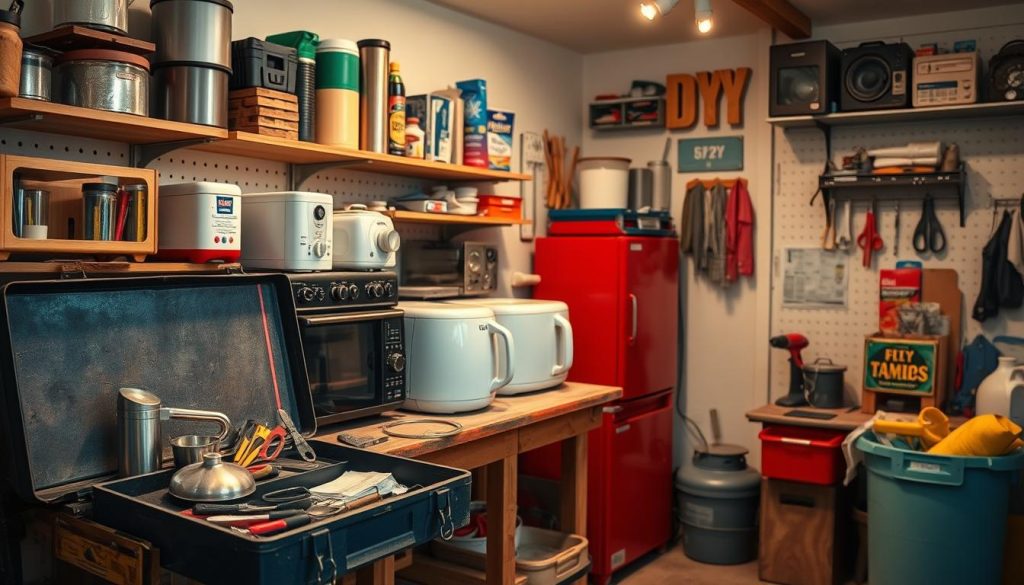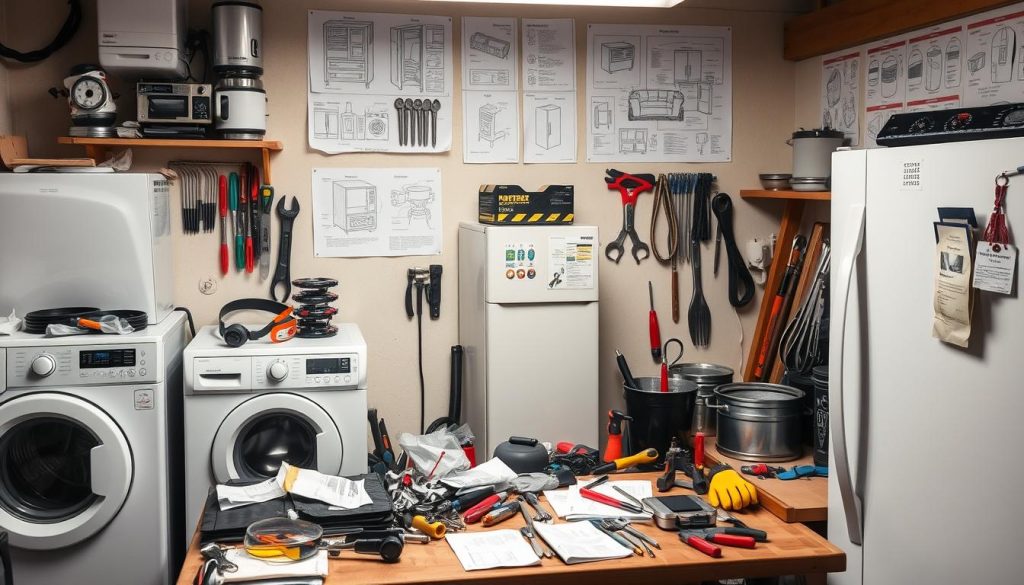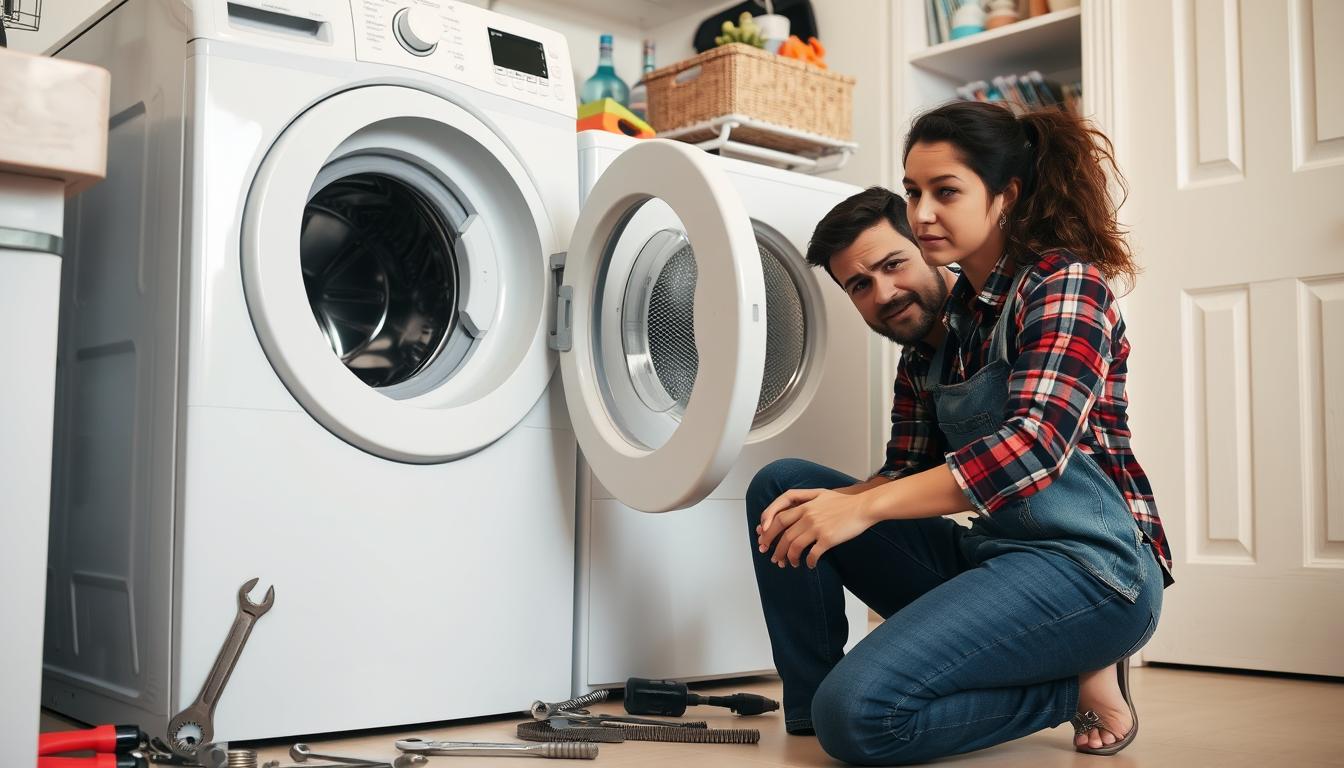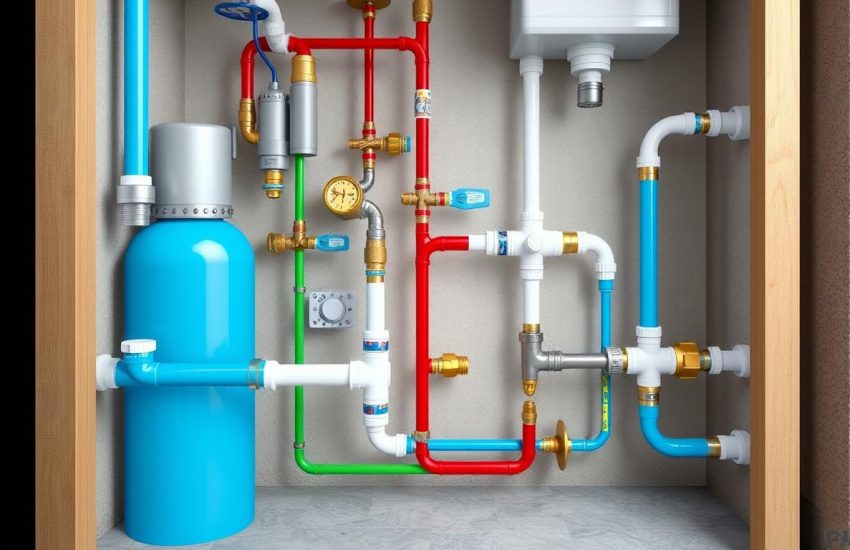Appliance Repair Tips: A Complete Guide for Homeowners
Ever had your fridge stop cooling in the hot summer? Or your clothes stay wet after a wash? Maybe your oven’s temps messed up your baking? You’re not alone. Our household appliances are our unsung heroes. They only get noticed when they break, making our days harder. But don’t worry. With some DIY appliance repair tips and basic knowledge, you can fix them.
Doing simple things like cleaning your fridge’s coils helps a lot. This can keep your drinks cold and lower your bills. In fact, it can stop about 70% of fridge problems. Also, not putting foil under your stovetop can prevent fires and save money.
For homeowners, using these home improvement tips can lower costs. With manuals and tools, starting DIY repairs is easy. But remember, always unplug appliances before checking them.
Sometimes, it’s too complex to fix things ourselves. That’s when pros like All Area Appliance in Colorado can help. They not only fix things but also teach you how to keep your appliances working well. Let’s learn more about keeping our appliances running. It’s time to take control and fix our homes.
Key Takeaways
- Understanding appliance operation basics is key to home appliance maintenance and repair.
- Simple DIY tasks, like cleaning refrigerator coils, can prevent common problems and save money.
- Professional repair services offer reliable fixes and access to genuine parts.
- Knowing common troubleshooting steps empowers homeowners to tackle some appliance issues independently.
- Regular cleaning and maintenance enhance appliance efficiency and extend their lifespan.
- Avoid potentially costly shortcuts, such as lining stovetop drip bowls with foil, which can lead to damage.
- Consulting a professional for complex issues can help maintain warranties and ensure safety.
Why Focus on Appliance Repair Tips?
Appliance troubleshooting is more than just fixing issues. It’s about knowing and keeping your essential home equipment running well every day. We focus on save money on appliance repair tips and common appliance issues and solutions. This helps homeowners to make good choices. Saving time and money is key. This also stops more damage to their valuable appliances.
Fixing appliances might seem scary. But knowing when you can fix something or must call a pro is crucial. Small problems like clogged filters or small tears in your fridge seal are easy to fix on your own. But, if your gas stove won’t work or your washer leaks, it’s safer to get help from a pro.
Keeping up with regular appliance upkeep and learning to deal with usual problems is smart. It helps homeowners handle their appliances better. Note that 95% of DIY fixes are often just a quick fix. Knowing the right appliance troubleshooting tips helps decide if you need a pro or can DIY.
Keeping appliances in good shape means they break less and work better. This means cheaper bills and longer appliance lives. Here are the best steps for every homeowner:
- Keep your appliances clean to avoid dirt and buildup.
- Check seals and hoses often to spot leaks early.
- Replace filters to keep things running smoothly.
- Follow the guide in the appliance manual for upkeep tips.
Putting focus on appliance repair tips is smart for the long term. It helps save on repair costs, boosts how well appliances work, or just makes them last longer. Every small step towards this is a big leap towards being a smarter, more responsible homeowner.
DIY vs Professional Help
Choosing DIY or professional appliance repair is tough for many. DIY means you save money now and learn a bit. But experts offer deep knowledge and assurance, especially for big problems. It’s good to know the benefits of both before deciding.
DIY repairs are great because they’re cheaper and you can do them right away. Simple tasks like cleaning or changing lights feel good to do yourself. But, big issues like motor or electronic problems are risky. Here, calling the pros is best to avoid making things worse or losing your warranty.
| Factor | DIY Repair | Professional Repair |
|---|---|---|
| Cost | Lower immediate expense, potential long-term costs if executed poorly | Higher initial cost, potentially lower due to expert resolution |
| Expertise | Limited to individual’s knowledge | Professional training and specialized tools |
| Warranty Risks | Possible voiding of warranty | Often maintains warranty, with some technicians offering additional guarantees |
| Safety | Higher risk of personal injury or property damage | Reduced risk with professional handling of electrical and mechanical hazards |
| Time Efficiency | Varies based on personal skill | Typically faster due to experience and access to resources |
Think about calling an expert if repair costs could be over half of buying new. This advice might save you cash and avoid constant fixing. Pros make sure repairs last by using proper parts and methods.
To wrap up, DIY is good for small fixes and learning about your appliances. But for big problems, the knowledge and safety from pros can’t be beaten. Consider your skills, risks, and costs before choosing DIY tips or expert help.
How to Save Money
Finding ways to save money on appliance repair tips is great for homeowners. It means we can spend less. Using affordable appliance repair tips and preventive appliance maintenance helps a lot. This is true whether fixing things ourselves or hiring experts.
Appliances often have warranties that may cover important parts for a while. Always check your appliance’s warranty. It might pay for some repairs, cutting down your costs. If the warranty’s up, think about the appliance’s age and condition versus buying new. Usually, repairing is cheaper than a new purchase.

Knowing how long appliances should last helps make smart choices. For instance, fridges last about 9 to 13 years. Gas ranges can go up to 17 years. Fixing things early helps them run well longer without sudden problems.
| Appliance | Average Lifespan | Maintenance Tips |
|---|---|---|
| Electric Range | 13 – 15 years | Regularly check and replace heating elements as needed. |
| Gas Range | 15 – 17 years | Clean burners and control knobs to ensure proper function. |
| Refrigerator | 9 – 13 years | Vacuum condenser coils every six months. |
| Dryer | 13 years | Clean the lint filter after every cycle and ensure the vent pipe is not obstructed. |
| Washing Machine | 5 – 15 years | Inspect hoses regularly for bulging, cracking, and leaks. |
Want to save on appliance repair costs? Get three estimates for repair or replacement. Preparing your appliance for repair can also save on labor costs. Plus, hiring an expert familiar with your appliance’s brand helps for a quick fix.
To sum up, regular maintenance and smart repair choices save money. Using your warranty helps too. These preventive appliance maintenance steps keep appliances working well and avoid big repair bills later.
Step-by-Step Upgrades
Starting DIY appliance repair helps save money and boosts appliance performance. Here are some easy upgrades you can do. Let’s look at these upgrades closely.
Consider refrigerators, for example. About half of fridge service calls involve the coils. It’s key to clean refrigerator coils. This step raises energy efficiency and cuts down utility bills. Also, changing old fridge gaskets keeps your fridge running well. It helps avoid expensive fixes later by stopping air leaks.

Washing machines and dryers need checks too. Don’t overload them to prevent costly breakdowns. Always clean out dryer lint to avoid fires, happening over 15,000 times a year. Check lids for damage to avoid spending over $100 on repairs. Most dryer issues, like heating problems, are fixable in under an hour with simple tools.
To dive deeper into maintenance and repair, check manufacturer resources and online help. These often share error codes and fixing steps.
Cleanup is vital for all appliances. Dirty dishwasher filters can cause dirty dishes, adding stress and cost. Also, cleaning stove burners removes food spills. This can fix burners that won’t light.
| Appliance | Maintenance Task | Performance Impact |
|---|---|---|
| Oven | Calibrate temperature settings | Consistent heating, reduced energy consumption. |
| Washing Machine | Clean and inspect drain hoses | Prevents leaks and motor stress. |
| Air Conditioner | Clean filters and check for mold/pests post-winter | Enhances air quality and cooling efficiency. |
| Refrigerator | Clean coils and seal gaskets | Improved cooling and energy efficiency. |
Spending time on DIY appliance repair tips makes our appliances last longer. They work better and more safely. With the right tools and a clear guide, anyone can improve their home appliances. This can help you avoid expensive expert repairs.
Final Tips for Success
To keep your home appliances running and do DIY repairs right, follow a smart plan. A guide with seven steps for fixing appliances yourself shows the way. The first step is to unplug the appliance, keeping you safe from electric shocks. Many are fixing things at home by themselves, showing that DIY is now more popular than calling pros.
Getting the diagnosis right is the first step to fix appliances. You can find step-by-step help online. For more tips on fixing things or knowing when to call a pro, check out Gulf Coast Appliances. Having the right tools, like screwdrivers and wrenches, helps a lot. Sometimes, you might need special tools for certain fixes. Writing down each step as you take things apart makes it easier to put them back together. It’s important to know when a repair is too hard and when to get help from a pro.
Breakdowns happen a lot, showing how important it is to take care of your appliances. Many people prefer to prevent problems than deal with them later. When something breaks, deciding whether to fix it or get a new one is a big choice. Paying attention to how often DIY fixes work and how long appliances last can help keep your home running smoothly. When repairs get tough, knowing when to call in a pro can save money and keep things working well.



